I apologize that it has been awhile since my last post,
April was a crazy month and I am still recovering from it.
The 8
th Annual
Fashion forPaws Runway Show was on April 12
th and it was a huge success.
The event raised over $425,000 that
will directly provide care and medical attention for the 43,000 animals that
the Washington Humane Society cares for each year.
Frank was a star of course and I was honored to speak at the
event this year as Executive Committee Chair.
Our delight in the Fashion for Paws afterglow was put out
quickly when Frank became sick a few days after the event. I first noticed that he was eating a
bit slower than usual and he seemed tired out on our walks. When he didn’t get up for his treat one
morning I knew something was really wrong and we rushed him right into
Friendship.
Dr. Calabro who is one of Friendship’s two amazing critical
care specialists examined Frank and found him to have a low grade fever and
back pain. Screening bloodwork was
submitted and he was started on intravenous fluids and pain medication. Friendship’s radiologist Dr. Hankin performed
radiographs and an abdominal ultrasound to rule out an infection of the
vertebrae called discospondolytits as well as look for any additional
underlying abnormalities. Thankfully
these were all normal. We also
submitted tick titers to make sure this wasn’t from an infectious cause such as
Lyme disease or Ehrlichiosis.
.JPG) |
| Being a good dog for his IV fluids |
His bloodwork came back with a slightly elevated white blood
cell count indicating systemic inflammation. Additionally his platelet count was low; platelets are the
blood cells that are responsible for clotting blood. The decreased platelets could be from an infection
destroying his platelets or again systemic inflammation. We added doxycycline to his treatment
and he spent the night in the hospital.
If his symptoms were due to a tick borne infection it should resolve
quickly on the doxycycline.
The next day his fever had come down a bit, he was eating
well and seemed to be feeling better so we took him home. Over the next day he was fine but still
acting very quiet and not himself.
I brought him back to the hospital about 36 hours after discharge to
have his bloodwork rechecked. Friendship’s
other criticalist, Dr. Gonzales took a look at him and found that in addition
to back pain he was now painful in his neck and multiple joints. The follow up bloodwork showed that his
platelets had not improved at all and his white cell cont was now higher.
At this point my husband and I were beside ourselves
worrying. Frank is only 4 years old, how could he get this sick so quickly and
how could we not know what was wrong with him. Our next step was to have Friendship’s orthopedic surgeon
Dr. Glassman evaluate his joint pain and take samples of joint fluid to see if
there was evidence of infection or inflammation in his joints. Frank had to be sedated for the joint
tap procedures, as it is painful to enter the joint and collect the
samples. Analysis of the joint
fluid did not show any abnormalities so we returned to looking at his neck and
back pain as the primary problem.
.JPG) |
| Waiting in Dr. Talrico's exam room |
The next day we headed out to Southpaws for a neurology
consult with the amazing Dr. Talrico.
The very first day Frank was sick Dr. Calabro discussed his case with Dr. Talrico who thought it sounded like a textbook case of Steroid-Responsive Meningitis-Arteritis (SRMA). The
cause of SRMA is unknown but it is auto-immune in origin meaning that for some
reason the body creates inflammatory cells that attack the central nervous
system. After a complete
neurologic exam Dr. Talrico recommended a CSF tap that would hopefully confirm
her suspicion of SRMA. For this
Frank was put under general anesthesia and a needed was passed between the
vertebrae in his neck to collect the fluid that surrounds his spinal cord. He recovered well from the procedure
and we headed home to wait for the analysis of the spinal fluid.
Here is where medicine can get frustrating; the results from
the CSF tap were suggestive of SRMA but not definitive. Unfortunately we can do all the testing
in world and still not have an exact answer of what is causing the
problem. In this situation it is
critical to work with a doctor that you trust and has experience with the
suspected disease process.
Veterinary medicine is often a puzzle; you have to take the history,
exam findings, test results and response to treatment and piece them all
together to get an answer.
Dr. Talrico
felt given his clinical signs and the results from all of his testing that we
caught the disease very early in its progress. This was actually good news because it meant with aggressive
treatment Frank has a much better prognosis for complete remission with no
future relapses. We started
steroids that day and within a few days he was feeling much better and his
platelet count was almost back up to normal.
This is not a disease he will ever be cured of and it always
has to be in the back of our minds as he can relapse at any time. Frank cannot ever be vaccinated again
as this could over-stimulate his immune system resulting in a relapse. I am most worried about not being able
to vaccinate him against leptospirosis.
I can monitor his immune protection against rabies, distemper and parvo
viruses with titers but not with leptospirosis.
My family is so thankful for all the amazing care Frank
received during this ordeal and that he is back to his normal
crazy/loving/adorable/playful self.
Drs. Calabro, Gonzales, Galssman, Romsland, Hankin and Talrico are brilliant
veterinarians and dedicated themselves to helping me figure out what was going
on with Frank. All of the
technicians that took care of him while he was in the hospital were gentle and
caring. I am lucky to count all of
these wonderful people as my friends and am grateful for Friendship and the
excellent care that is available to all of us here in DC. So go home tonight and give your pets a
big hug and a kiss, each day we have with them is truly a gift that should be
treasured.
.JPG) |
| He has a new haircut to even out all his shaved areas and is feeling much better! |
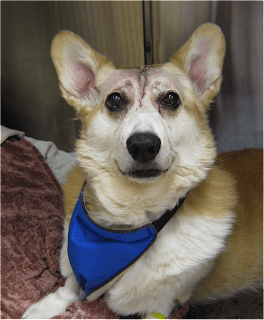
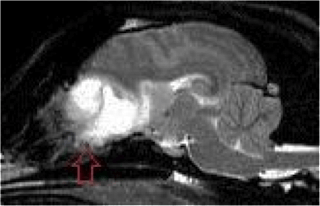
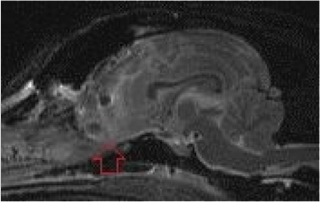
 As a pet owner who lost a dog to not one, but three types of cancer--lymphoma, melanoma and hemangiosarcoma--I know firsthand how devastating, confusing and overwhelming this diagnosis can be. The only possible shred of good news is that you have the warm, caring embrace of the Oncology Department at Friendship available to you.
As a pet owner who lost a dog to not one, but three types of cancer--lymphoma, melanoma and hemangiosarcoma--I know firsthand how devastating, confusing and overwhelming this diagnosis can be. The only possible shred of good news is that you have the warm, caring embrace of the Oncology Department at Friendship available to you.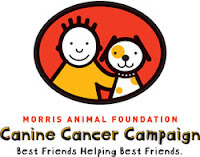

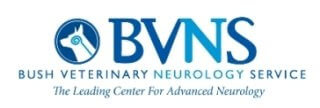

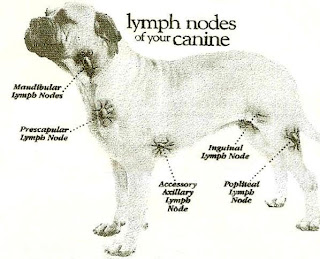
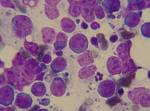
 The most important thing to keep in mind when treating cancer in animals is that our goal is not to cure. Instead, we want to prolong the animal’s life while maintaining a good quality of life. People are blasted with chemotherapy drugs to try and kill all of the cancer. This is why people get so sick. With animals, we administer lower doses of drugs with the intent to kill as many of the cancer cells as possible without making the patient feel bad.
The most important thing to keep in mind when treating cancer in animals is that our goal is not to cure. Instead, we want to prolong the animal’s life while maintaining a good quality of life. People are blasted with chemotherapy drugs to try and kill all of the cancer. This is why people get so sick. With animals, we administer lower doses of drugs with the intent to kill as many of the cancer cells as possible without making the patient feel bad.

 It could mean nothing or it could indicate that there is heart disease present. The only way to know is with an ultrasound of the heart called an echocardiogram. This procedure takes around 30 minutes and is done by a board certified cardiologist. Usually sedation is not necessary and you are with your pet the entire time. The doctor will image the heart and see if there is disease present such as thickening of the heart wall or abnormalities with the valves.
It could mean nothing or it could indicate that there is heart disease present. The only way to know is with an ultrasound of the heart called an echocardiogram. This procedure takes around 30 minutes and is done by a board certified cardiologist. Usually sedation is not necessary and you are with your pet the entire time. The doctor will image the heart and see if there is disease present such as thickening of the heart wall or abnormalities with the valves.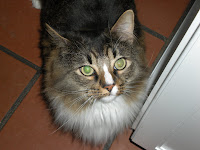 A few weeks ago, I noticed that one of my cats had begun vomiting at least one a day. After a couple of days of observation--and one morning of being woken up to the sound of vomiting--I determined that it was my cat Breaker.
A few weeks ago, I noticed that one of my cats had begun vomiting at least one a day. After a couple of days of observation--and one morning of being woken up to the sound of vomiting--I determined that it was my cat Breaker.

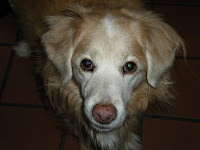
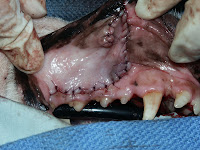
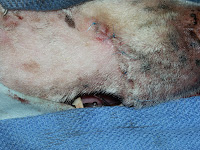

 Though most cancers in companion animals are, unfortunately, not yet curable, many are now treatable thanks to devoted doctors like Chand Khanna and organizations like the Morris Animal Foundation. We are making great advances in managing cancer in our beloved pets and one day we will find a cure. Westin has responded unbelievably well to her treatments but I know some day she will not be able to fight anymore. I treasure each day with her and consider myself blessed that she has Dr. Khanna and the oncology service at Friendship looking after her.
Though most cancers in companion animals are, unfortunately, not yet curable, many are now treatable thanks to devoted doctors like Chand Khanna and organizations like the Morris Animal Foundation. We are making great advances in managing cancer in our beloved pets and one day we will find a cure. Westin has responded unbelievably well to her treatments but I know some day she will not be able to fight anymore. I treasure each day with her and consider myself blessed that she has Dr. Khanna and the oncology service at Friendship looking after her.
